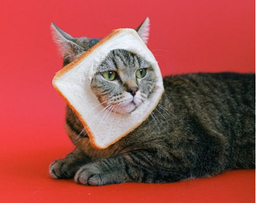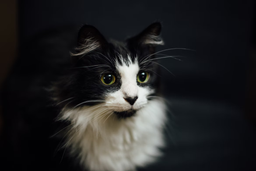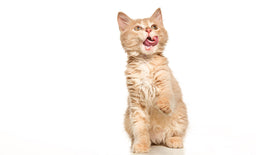As regular as clockwork with the best gastrointestinal cat food from Untamed
There is nothing worse than watching your kitty suffer from gastrointestinal problems—except, perhaps, having to clean up afterwards.
Cats can suffer from Montezuma’s revenge as easily as—and often more so than—humans, and the consequences can be gut-wrenching.
Most gastrointestinal problems clear up on their own quickly, but frequent bouts of the runs could be a sign that something more serious is going on.
Untamed has the advice you need to stop digestive problems or avoid them in the first place with adequate gastrointestinal cat food.
Your cat’s diet is the crucial factor—whether your kitty’s preferred food is dry, wet, raw, or homemade, you should offer the highest-quality tailor-made meals to keep their stomach calm.

Do something, Mummy!
Source: Pixabay
What are the symptoms of a gastric problem in cats?
It’s not uncommon for cats to suffer from mild digestive problems, and the list of possible causes is long.
The typical symptoms of stomach upsets are as follows:
- Vomiting or retching
- Constipation or diarrhoea
- Refusing food
- Swelling or pain around the tummy
Vomiting or retching
If you notice your cat retching or vomiting and can’t see any evidence of a hairball, they may be dealing with a digestive problem caused by:
- Eating something rotten
- Swallowing a foreign object
- Having something toxic in their stomach
If the vomiting is a one-off occurrence, there is probably no cause for alarm. In case it is accompanied by other symptoms of gastrointestinal problems, you should start investigating further.
Diarrhoea or constipation
You are the best person to notice when your kitty has a digestive problem as you are most likely the one who cleans out the litter tray.
If you notice any significant changes, you should have your cat checked out to determine what may have caused it.
Refusing food
If your cat normally has a healthy appetite but begins refusing food, it may be a sign of gastrointestinal issues.
The loss of appetite can be dangerous if it lasts longer than 24 hours as cats quickly begin converting fat reserves to energy. This condition can lead to rapid weight loss and possibly even liver damage as the organ gets flooded with fat.
Swelling or pain around the tummy
Sudden distension of the tummy area or loud meowing when you try to pick your kitty up could be a sign of stomach pain.
Even though your feline may not be exhibiting any other symptoms, stomach pain is not normal and needs to be checked out.
Even behavioural changes—your cat being distant, less playful than usual, or trying to hide from you—should be investigated because something serious might be happening.

Don’t touch me—I’m not well!
Source: Pixabay
What can cause gastrointestinal problems in cats?
Reasons for gastric problems in cats are numerous, and they can be divided into:
- Short-term (acute) problems
- Mild chronic issues
- More severe long-term diseases
Short-term (acute) problems
The most common acute causes of tummy upsets are:
|
Acute cause |
Explanation |
|
Eating spoilt food |
Table scraps, scavenged rubbish, vermin, or birds can all cause an upset tummy |
|
Change in food |
If you switch your cat to different food, you can often see the results in the litter tray. Your best course is to gradually change their food by adding more of the new product to the bowl every day for a week |
|
Stress |
Cats love routine and easily get stressed by changes, often leading to vomiting or diarrhoea |
These issues typically clear up after a day or so without interference, but it is wise to investigate the cause so you can prevent future problems.
Mild infections
Milder cases of infections are not serious but can cause long-term distress if left undiagnosed and untreated.
During your kitty’s life, you will probably encounter the following:
- Viral infections
- Bacterial infestations, including salmonella and E. coli
- Parasites, such as worms
- Food allergies
Although treatable, these conditions need to be diagnosed and dealt with as quickly as possible—particularly in kittens.
More severe long-term diseases
Several chronic illnesses can cause digestive problems, among which are:
- Cancer
- Chronic pancreatitis
- Hyperthyroidism
- Kidney insufficiency
These issues need vet supervision. Part of the management regime will involve your cat’s diet being controlled carefully to keep the condition in check.
What makes a good cat food for gastrointestinal problems?
Whether your feline’s gastrointestinal problems are acute or chronic, the principles behind good nutrition remain the same.
Cats are obligate carnivores, evolved to process small but frequently consumed amounts of:
- Animal protein
- Animal fat
Animal protein
Protein consists of amino acids used by your feline to synthesise the building blocks for the maintenance of:
- Muscles
- Skin and coat
- Organs
Cats can get some amino acids from vegetable protein sources, but it wouldn’t be enough to cover their nutritional needs. You should remember that cats living in the wild eat up to 20 times a day, with each meal consisting of a small animal or bird.
Domestic cats are often given one or two large meals each day, and their bodies aren’t designed to cope with such a massive intake of nutrients in one go.
Smaller and more frequent portions of good-quality animal protein are the best way to ensure your cat’s digestive system stays healthy.
Animal fat
Coupled with protein, fat is a viable source of energy, delivering twice as many calories per gramme as carbohydrates.
Animal fat also delivers essential fatty acids, such as:
- Arachidonic acid
- Linoleic acid
- Omega-3 and omega-6
They play a vital role in maintaining cell structure and your feline’s healing processes.
An added advantage of animal fat is that cats go wild about its taste. Food labelled as cat jelly or gravy usually contains the animal fats your kitty will love.
What should you avoid in cat food?
Many commercial cat foods use substances that, while not harmful to felines, don’t give them much nutritional value.
By checking the ingredients list, you can avoid products containing the following:
- Grains or cereals—Grains and cereals are often used to bulk up a product, allowing the manufacturer to use less meat. Cats can get the amino acids they need from wheat, corn, and similar, but the amounts they must eat will be massive, and felines won’t get enough taurine (an essential amino acid they can only get from meat)
- Carbohydrates—Carbs are also used as bulking agents and flavour enhancers. Your cat can get fast-burn energy from carbs, but those not used up immediately will be stored as fatty cells. Your kitty can easily gain weight because they won’t get enough slow-release energy to stay active. Lethargy plus carb calories make the cat overweight
- Additives, preservatives, colourings, or flavour enhancers—Artificial ingredients can often cause tummy upsets in cats and are generally unnecessary in high-quality cat food
What gastrointestinal health cat food should you give to your cat?
Your choice of food to get your feline’s digestion on track depends on whether you are trying to address:
- An acute digestive problem
- Chronic gastrointestinal issues
An acute digestive problem
If your kitty has suffered from a short-term bout of diarrhoea or vomiting, and you want to speed up the recovery process, you must address the following:
- Water intake—Vomiting or diarrhoea can quickly lead to dehydration, which can cause kidney and bladder issues. Your best course of action is to switch from dry kibble to a wet food diet with a moisture content of over 75%
- Small, energy-dense portions—You don’t want to compromise your feline’s system any further, so your cat must get enough energy. The best recommendation is a high-protein, high-calorie food delivering goodness in small portions. This is particularly important with kitten food because you must make sure that your kitty’s development is not compromised after weaning
- Safe cooking—You may want to avoid raw food if your kitty has an upset stomach. Gentle cooking removes harmful bacteria, which are often the cause of digestive problems
Chronic gastrointestinal issues
If your feline has a sensitive stomach or is prone to mild long-term tummy upsets, your vet should identify the cause and suggest the treatment.
Even if the problems are temporary or easy to solve, you should choose a meal plan that supports good gastric health by mimicking a natural diet as closely as possible.
The principles are the same as for acute digestive problems, but the food you choose for everyday digestive health should contain the following:
|
Major food groups |
Ideal values |
|
Animal protein |
More than 50% |
|
Animal fat |
Up to 20% |
|
Carbohydrates |
Less than 3% |
You should look for the following ingredients at the top of the list:
- Chicken
- Salmon
- Sardines
- Prawns
- Tuna
- Liver
- Ham

The best protein sources are what your cat needs
Image (c) Untamed
Can Untamed help with gastrointestinal food for cats?
Untamed has the perfect solution to get your feline’s stomach back to normal and keep it there.
Our products are hypoallergenic and formulated to give your cat:
- Optimal nutrition in small, manageable portions
- Highly digestible ingredients
- Great-tasting food to boost the appetite
Apart from the gastrointestinal benefits, our food adheres to the following principles:
- High levels of animal protein
- Vet-formulated formulas
- Gentle steaming
- Human-grade ingredients
- Hypoallergenic ingredients
High levels of animal protein
Untamed contains more than twice the amount of animal protein other cat foods offer.
Your furry companion is sure to get the required nutrients without having to wolf down huge portions, which is essential if your kitty needs lots of calories in small portions.
Vet-formulated recipes
All our recipes are formulated with the help of cat nutritionists.
We want your feline to get the best, so we make sure each meal is healthy and sufficient.
Gentle steaming
Aggressive cooking can destroy the nutrients in your feline’s food, so we steam our food gently to get rid of harmful bacteria while sealing the goodness in.
Human-grade ingredients
Our ingredients are fit for human consumption, and we don’t use additives, flavourings, or preservatives that could upset your kitty’s tummy. We also use recyclable packaging and manufacture our food respecting the highest ethical standards.
Hypoallergenic ingredients
A selection of our meals is made from a single protein source.
All our recipes have been specifically formulated to be minimally processed and free from common allergens. For sensitive cats, we recommend our single-protein-source recipes like Chocka Chicken and Tuck-in Tuna!
Give Untamed a try and see the results!
How can you get Untamed cat food for gastrointestinal health?
Getting Untamed delicacies couldn’t be simpler—no need to go hunting for our products, they will come to you!
All you need to do to get your first cat food delivery is:
- Visit our Try Now page
- Tell us more about your kitty
- Select a meal plan and place your order
The goods will arrive on your doorstep in no time, and your cat can go Untamed immediately.
Once they have munched their way through the trial pack, you can let us know which dish got the seal of approval—even if it’s all of them—and we will start sending you a monthly cat food subscription box to keep your feline healthy and happy!
Check out the most significant benefits of Untamed food (reported by satisfied cat parents):
|
Timeline |
Untamed effect |
|
Within the first week |
|
|
In two months |
|
|
After four months |
|
|
For life |
|

Happiness is a cat food called Untamed
Image (c) Untamed
What else can you do to keep your kitty’s gut healthy?
Besides adequate nutrition, there are a few other things you can do to minimise gastrointestinal problems.
Here’s what you should try:
- Stop giving your cat snacks and food from the table
- Eliminate their contact with toxic substances
- Hunting and eating prey
- Stress reduction
Snacks and food from the table
If your trouser legs are shiny from being rubbed with cat fur, and you have bruises from constant head-butting, your kitty has learned that begging works.
However harsh it may seem, you need to resist the temptation to offer treats, offcuts from cooking, and titbits from the table.
If your cat already has a sensitive stomach, your best bet is to keep the diet as consistent as possible—any deviation could cause unpleasant consequences.
Toxic substances
Cats are naturally willing to try anything new that looks or smells like food.
Anything left lying around the kitchen is in danger of being tasted, and this can include products harmful to cats, such as:
- Chocolate
- Coffee
- Onions, garlic, or chives
- Berries and citrus fruits
- Dairy products, such as milk, cheese, or yoghurt
You should get into the habit of keeping your kitchen clear of food lying around.
Some plants are also toxic to cats. Although you may have seen your kitty eating grass in the garden, not all plants are as benign. Keep your furry companion away from:
- Azalea
- Daffodils
- Caladium
- Rubber plants
- Philodendron
- Swiss cheese plants
- Oleander
- Most lily varieties
- Poinsettia
- Holly berries
If you can’t remove these from your house, try to keep them out of your cat’s reach (and good luck with that).

This looks yummy!
Source: Pixabay
Hunting and eating prey
Stalking and killing rodents and birds in the neighbourhood may be cat heaven, but eating them can quickly lead to bowel disorders.
Tricks to stop felines from being felines are:
- Fit a collar with a bell on it
- Play more with your cat to redirect the hunting energy towards feathers or laser pointers
- Make sure they are not hungry
- Keep them inside during the times they normally hunt
Stress reduction
One of the most common causes of gastrointestinal problems in cats is stress.
Cats love predictability and routine, so any changes should be introduced gently and over time.
The disruptions leading to digestive problems are:
- Moving the feeding bowl to a new location
- New pets in the household that could be regarded as rivals
- Unpredictable feeding, playing, and sleeping times
- Sudden noises or movement near the feeding area
The more you can do to reduce disruption to your cat’s routine, the happier they will be.
What could happen if your feline has chronic gastric problems?
Chronic gastric problems are serious and may need veterinary treatment.
As cats get older, their digestive function decreases, but high-quality food can keep their system working like clockwork. Younger adults and kittens shouldn’t suffer long-term gastric problems, though.
If you spot any signs of gastrointestinal distress, you shouldn’t hesitate to get your kitty to the vet to find out whether there is an underlying problem. Prolonged gastric problems can have serious consequences, including:
- Dehydration
- Weight loss
- Organ damage
A watchful eye combined with the best possible nutrition should keep your feline free from the runs and unnecessary pain.

![Best food for Ragdoll cats in the UK [Broken Down]](http://untamed.com/cdn/shop/articles/featured_best_food_for_ragdoll_cats_uk.jpg?v=1646818249&width=256)

